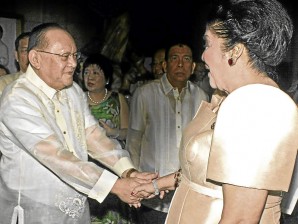SC ruling on Cojuangco shares in SMC assailed

LIKE OLD TIMES. Business magnate Eduardo “Danding” Cojuangco shakes hands with former first lady Imelda Marcos during the 40th wedding anniversary of Miriam and Narciso Santiago on Sunday. JOSEPH AGCAOILI
A peasant leader on Wednesday said the affirmation with finality by the Supreme Court on Tuesday of Eduardo “Danding” Cojuangco’s hold on 20 percent of the shares of stock in San Miguel Corp. (SMC) meant the “final execution” of the coconut farmers.
Danny Carranza, secretary general of the peasant coalition Katarungan-Quezon, said in a phone interview that “the Supreme Court decision only shows the great injustice being continuously inflicted on the helpless coconut farmers by powerful forces in our society.”
“This decision also served as the final execution of the coconut farmers. They are now destined to further starvation and slow death,” he said.
“The message is simple: In this country, amass what is not yours and you will be blessed. There is a reward for the guilty.”
The Coconut Industry Reform (COIR) Movement joined former Senators Jovito Salonga and Wigberto Tañada and the Presidential Commission on Good Government (PCGG) in filing a motion for reconsideration of the Supreme Court decision on April 12.
Article continues after this advertisementIn that ruling, the high tribunal said the PCGG under the Arroyo administration had failed to prove that Cojuangco was a crony of the dictator Ferdinand Marcos and equally failed to substantiate claims that the SMC shares were acquired using coconut levy funds.
Article continues after this advertisementJoey Faustino, COIR executive director, said in an interview over ANC television on Wednesday that lawyers were considering filing a “forfeiture case” that would question how a public official like Cojuangco could acquire such a huge amount of wealth to buy a fortune such as a big block of SMC shares.
“It will no longer be about ill-gotten wealth, but about forfeiture,” Faustino said.
Another setback
The newly reconstituted PCGG under the Aquino administration described Tuesday’s court ruling as “another setback for the republic’s efforts to recover the coco levy funds and to restore them to the hands of the Filipino coconut farmers, from whose labors and toils these funds were taken.”
In the brief statement, the PCGG added, “As the commission awaits the receipt of the official copy of the Supreme Court’s resolution, it will study the best possible course of action in order to secure for our coconut farmers the justice that they truly deserve.”
President Aquino has not stated a position on the disputed SMC shares concerning Cojuangco, who is his uncle and who was one of the major contributors in his presidential election bid in May 2010.
Coconut reform activists have expressed apprehension at the presidential silence in the controversy, noting that Mr. Aquino was quick in the past to slam setbacks at the hands of the magistrates.
Hacienda Luisita
The Supreme Court also is expected to hand down a decision soon on the 6-year-old case involving farmers’ demands for the redistribution of the 6,500-hectare Hacienda Luisita owned by the family of Mr. Aquino’s mother, the late President Corazon Cojuangco-Aquino.
The sugar plantation is appealing an Arroyo administration decision rescinding a stock distribution option under the Comprehensive Agrarian Reform Program, centerpiece of a social justice initiative by Mr. Aquino’s mother in 1988, saying it had not benefited the hacienda’s farmers.
The coconut levy was imposed by Marcos a year after he declared martial law in 1972 and lasted until 1983. Its avowed aim was to ameliorate conditions of coconut farmers who are among the poorest of the poor Filipinos and develop the industry that is one of the major sources of the Philippines’ foreign exchange. They are still dirt poor and the industry has not progressed any.
An audit conducted after the dictator’s ouster in 1986 showed that some P9.7 billion was collected during the nine-year period from 6 million coconut farmers and deposited in state-owned United Coconut Planters Bank (UCPB), which Cojuangco then headed.
The SMC shares acquired by Cojuangco in 1983 were originally worth P374 million.
Another block of SMC shares comprising 31 percent of the shares in the food and beverage conglomerate worth P1.6 billion was acquired also in 1983 by a group of 14 companies controlled by Cojuangco under the Coconut Industry Investment Fund that he managed. This bunch was labeled CIIF shares in court litigations.
Doctrine turned around
The two portfolios cost a total of P2 billion at the time of their acquisition, allegedly using, according to state lawyers, coconut levy funds. They were ordered sequestered in the aftermath of the 1986 People Power Revolution.
In a landmark ruling in 2001, the Supreme Court held in a case involving UCPB shares, that assets acquired using public funds were “prima facie public.”
Applying the ruling in 2003, the Sandiganbayan awarded the CIIF’s SMC shares to the government. The judgment lapsed into finality even as Cojuangco’s SMC shares were being adjudicated in court.
Lawyers familiar with the case said the businessman had sought a “global compromise” in which he would give up the CIIF shares to the government so long as he could keep his shares.
State lawyers used in the case against Cojuangco in the Supreme Court the same arguments they advanced in the CIIF-SMC litigation in the Sandiganbayan: that the SMC shares were purchased by the businessman using levy funds in violation of his fiduciary trust as UCPB chief and that he used the influence of the dictator Marcos in amassing the asset.
In its April 12 ruling, the high tribunal turned its back on the CIIF-SMC conclusions and said the government had failed to prove that Cojuangco used the levy money to buy the shares and equally failed to establish that the tycoon was a Marcos associate who violated his mandate to keep the farmers’ money for their benefit.